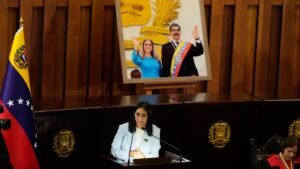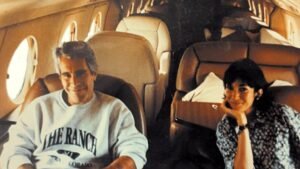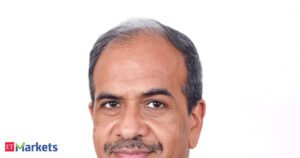Many African Nations Making Progress within the Rule of Legislation — World Points
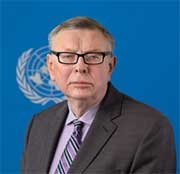

UNITED NATIONS, Might 06 (IPS) – The United Nations Workplace of Rule of Legislation and Safety Establishments (OROLSI) helps the promotion of the rule of legislation, safety, and peace in conflict-affected nations.
In an interview with Kingsley Ighobor of Africa Renewal, Alexandre Zouev discusses OROLSI’s initiatives in Africa, rule of legislation on the continent, latest coups and their ramifications, and youth’s function in fostering peace and growth.
The next are excerpts:
What is the Workplace of the Rule of Legislation and Safety Establishments about?
We deal largely in 5 main areas, that are: the Police Division, Justice and Corrections Service, Disarmament, Demobilization and Reintegration Part, Safety Sector Reforms, and Mine Motion Service.

How would you assess the present state of the rule of legislation in Africa?
As you recognize, currently, we have witnessed some international geopolitical tensions that do not assist the rule of legislation. During the last one to 2 years, the rule of legislation eroded globally, in lots of, if not nearly all of nations. Newest information point out that as much as 6 billion individuals globally stay in a rustic the place the rule of legislation is weakened. We’re involved about this development.
Speaking about Africa, particularly sub-Saharan Africa, the rule of legislation deteriorated in additional than 20 nations. Nevertheless, I have to word that about 14 African nations managed to strengthen their rule of legislation over the past 12 months, together with Kenya, Liberia, Tanzania and Cote d’Ivoire.
Do you ascribe the deterioration of the rule of legislation in African nations to geopolitical challenges?
In fact, international challenges to peace and safety have implications for the rule of legislation. By way of organizing elections or managing the judiciary or penitentiary, many African nations nonetheless rely on exterior technical help.
In lots of of those conditions, there are additionally inner drivers similar to an absence of entry to justice, the absence of adequately skilled legislation enforcement and an unbiased judiciary. So, it is a mixture of regional and international instability and inner elements.
There seems to be a resurgence of navy coups, particularly in West Africa.
You might be proper. We have now witnessed the navy taking energy, particularly within the higher Sahel Area. It does not assist the rule of legislation if, as a substitute of a civilian justice system, you’ve got navy forces taking part in a task in political and judicial methods.
How are you serving to these nations deal with these challenges?
As I stated earlier, Africa is our main focus, particularly sub-Saharan Africa. And it is on account of completely different causes: some gaps within the rule of legislation in some nations and due to sure growth challenges. Usually, poverty could be very a lot linked to criminality and ill-functioning judiciary methods. Price range deficits and lack of efficient fiscal administration will stop any state from allocating satisfactory sources to the rule of legislation sector. In a perfect scenario, the rule of legislation needs to be very well-resourced however not each state can afford it.
Do you additionally work with, for instance, civil society organizations in nations?
We make investments efforts in working with civil society organizations. In our view, ladies and youths are essential brokers of peace. We have now many strategic frameworks with the African Union (AU). The AU and the EU are two main regional organizations partnering with UN Peacekeeping, together with my workplace.
On the sub-regional stage, we’ve got completely different levels of engagement. For instance, we accomplice with the Inter-Governmental Authority on Growth (IGAD), United Nations Workplace for West Africa and the Sahel(UNOWAS), Financial Neighborhood for West African States (ECOWAS), Southern Africa Growth Fee (SADC), and different subregional organizations.
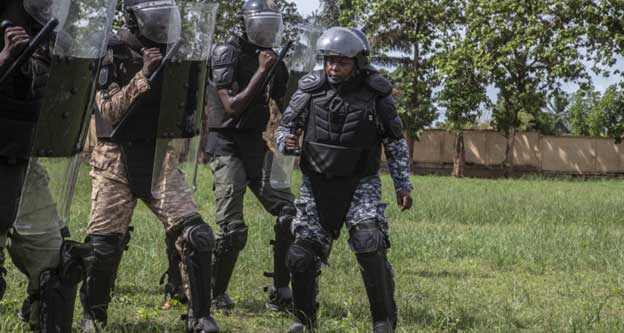
How vital are safety sector reforms (SSR) to the rule of legislation?
It is a small however essential a part of my workplace as a result of SSR offers with generally delicate navy and safety points with vital political implications. And never all governments wish to be scrutinized.
To help SSR requires dependable statistics. For instance, how a lot is being spent on the navy, civil protection, secret companies? When states request, we can assist convey to them greatest practices and methods during which to construct the capability of their safety sector. You do this sort of work with full respect to unbiased decision-making by host nations, their sovereignty, confidentiality of processes, and non-disclosure of knowledge to 3rd events.
Do you help nations the place there are not any peace operations?
Completely. OROLSI has a system-wide service supplier mandate. We’re more and more specializing in prevention, which is far more economical. One of many primary instruments we developed for that’s the institutional growth advisory programme. We piloted this programme within the Sahel area. We deploy institutional growth advisors to assist nationwide governments and the UN system deal with the primary challenges dealing with the rule of legislation and safety establishments.
So, the IDAs will not be transactional or mission-driven like help. We depend on the resident capability inside the UN system. We work with different UN companions, particularly United Nations Growth Programme (UNDP), United Nations Workplace for Disarmament Affairs (UNODA), and the Workplace of the United Nations Excessive Commissioner for Human Rights (OHCHR)— OHCHR as a result of, in lots of instances, the rule of legislation requires the promotion of a tradition of human rights. So, IDAs assist combine inter-agency collaboration. It has to this point confirmed very profitable.
Many nations confront violent extremist teams similar to Boko Haram. What function do you play in serving to sort out this drawback?
Peacekeeping was not established within the UN system for counter-terrorism operations. Due to this fact, we collaborate intently with the Workplace of Counterterrorism (OCT), and the Counterterrorism Committee Government Directorate (CTED), which was established by the Safety Council.
Virtually all UN companies and departments are concerned within the prevention of violent extremism. And we are not any exception. Our comparative benefit lies in constructing the capability of host states to counter terrorism and forestall violent extremism by means of strengthened rule of legislation and safety establishments and programmes to help affected populations together with by means of group policing and DDR.
For those who have a look at some terrorist organizations similar to ISIS, it isn’t solely about women and men preventing with arms; they’ve their households, generally even youngsters, who’re indoctrinated. Some left their nations, and to reintegrate them shouldn’t be simple.
Do you see optimistic outcomes out of your work in Africa?
Usually, we’re getting lots of sources from the assessed budgets of the United Nations and extra-budgetary contributions of our donors, however it’s not enough.
Funding in any sort of reform or capability constructing within the rule of legislation sector is a multi-year train; you can’t do it in a single day, in a single week, or one month. We’re getting in the proper route, however possibly not with the pace that I would love.
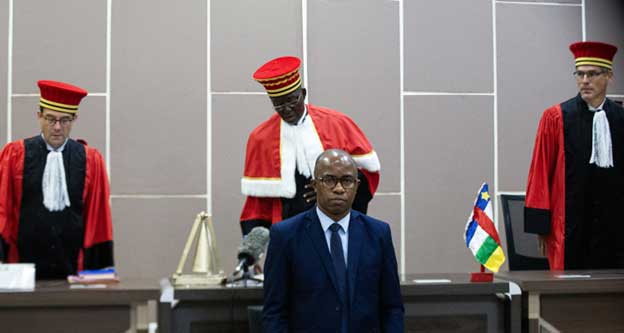
Do the closures of peacekeeping missions in Africa, similar to in Mali, complicate your work?
What complicates our work shouldn’t be the closure or liquidation of missions; it’s the way it occurred in a hostile atmosphere and below unrealistically brief timelines. evacuating, liquidating, phasing out and drawing down missions might be difficult. Nevertheless, we efficiently closed our missions in Liberia, Cote d’Ivoire, and Mozambique.
Nations like Mali and Sudan are, possibly, more difficult environments. To shut our mission in Mali, which was one of many largest missions with about 13,000 personnel, hundreds of autos, and armored carriers, the federal government gave the Safety Council solely six months. It was virtually mission unimaginable, however we managed to do it.
What function do you suppose younger Africans can play in fostering peace and growth of the continent?
As you recognize, the Secretary-Common has an Envoy on Youth. I consider in funding in our future, which younger individuals signify. It does not matter if it is in Africa, Asia, or Europe, it is vital to contain younger individuals—for the sake of not solely my era but in addition that of my youngsters and grandchildren.
When younger persons are educated, they turn out to be vital brokers of change. I’m not essentially speaking about political or authorized training. Generally, it might be engagement in sports activities or cultural occasions.
Are you able to envision an Africa with out conflict?
Dr. Martin Luther King stated, “I’ve a dream.” I, too, have a dream that in the future we’ll shut down this store . If there are not any wars and no conflicts, there will likely be no want for peacekeeping.
Trying into sure developments in sub-Saharan Africa, the Maghreb within the north of Africa, you noticed what occurred in Libya over the previous few years; you see what is going on on in Sudan; in Somalia, we nonetheless have the confrontation between al Shabaab and the Somali authorities.
Realistically, we can’t cease these conflicts in a single day. As long as they exist, we should always make investments extra in sure kinds of peacekeeping operations, maybe AU-led. I consider that African issues might be solved by Africans.
We’d like partnerships with regional organizations such because the EU and the AU, and different sub-regional organizations in Africa. The personal sector ought to play a particular function, together with African enterprise leaders. A few of them already spend money on peacebuilding and sustainable financial methods.
We have to get the perfect out of all of us.
Supply: Africa Renewal, United Nations
Africa Renewal is a United Nations digital journal that covers Africa’s financial, social and political developments, and the challenges the continent faces and options to those by Africans themselves, together with with the help of the United Nations and worldwide group.
IPS UN Bureau
Observe @IPSNewsUNBureau
Observe IPS Information UN Bureau on Instagram
© Inter Press Service (2024) — All Rights ReservedAuthentic supply: Inter Press Service
